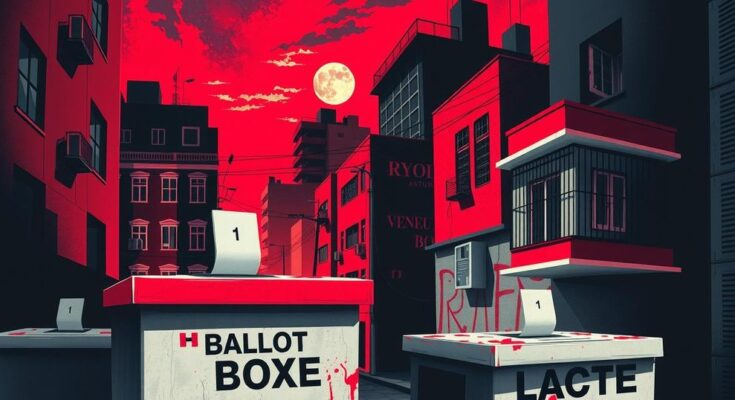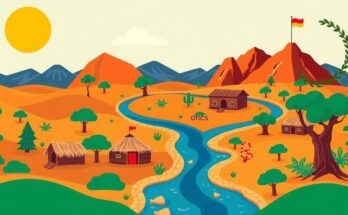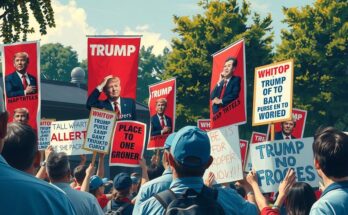Venezuela prepares for elections amid calls for a voter boycott by the opposition, citing a lack of election legitimacy. Maria Corina Machado leads the boycott against President Maduro, while Henrique Capriles argues for participation. Tensions run high with arrests of opposition members and increased security presence. The election comes amidst significant economic instability and international scrutiny, especially regarding oil revenues and territorial disputes with Guyana.
Elections are upon Venezuela again, returning to the polls this Sunday, a mere ten months after President Nicolas Maduro claimed his contentious third term, overshadowed by allegations of fraud and violence. Now, as the nation gears up to elect a new parliament and 24 state governors, the core issue of voter turnout looms large. The leading opposition is actively urging citizens not to participate, viewing this election as yet another farce.
Maria Corina Machado, an engineer and former lawmaker at the helm of the opposition, has rallied for a voter boycott, insisting that participation would only legitimize what she and her supporters deem a fraudulent electoral process. Meanwhile, there’s dissent among opposition factions; some, like Henrique Capriles, a two-time presidential candidate, are rejecting the boycott approach. He emphasizes the importance of voting as “an act of resistance, of struggle” against the Maduro regime.
Tensions are running exceptionally high with more than 400,000 security personnel deployed to oversee the election. Just days before the vote, Juan Pablo Guanipa, a key ally of Machado, was arrested under accusations of orchestrating a “terrorist network” against the voting process. His arrest has been linked to a recent roundup of individuals, purportedly mercenaries funded by foreign interests. These allegations continue to highlight the Maduro government’s narrative of foreign threats against its sovereignty.
Guanipa’s situation is not isolated; many opposition leaders face severe repercussions for their dissent. Edmundo Gonzalez Urrutia, another prominent contender, fled to Spain after threats against his safety surfaced. Following Guanipa’s arrest, messages circulated on social media suggesting he was a victim of what his supporters characterize as kidnapping by the regime.
This election cycle is particularly critical as many opposition supporters are disenchanted with the electoral integrity after Maduro’s last claimed victory. During that election, detailed results were largely absent, while the opposition’s own counts indicated a clear victory for Gonzalez Urrutia. The resulting protests were met with brutal crackdowns, solidifying Venezuela’s reputation as a pariah state. Recognized by few, most notably allies like Cuba and Russia, Maduro’s administration faces ongoing international isolation.
Moreover, the ongoing economic crisis, stemming from mismanagement and sanctions, looms over these elections. With the recent withdrawal of Chevron’s operations in Venezuela ordered by the U.S. government, Maduro’s regime faces a critical threat to its oil revenues, arguably its last remaining resource. Alongside, the U.S. has rescinded deportation protections for hundreds of thousands of Venezuelan migrants, further pressuring the regime.
This Sunday marks a significant moment as Venezuela also holds elections for the oil-rich region of Essequibo, claimed by both itself and Guyana. This location is fraught with historical territorial disputes, adding another layer of controversy to the already fraught electoral situation. As the country eyes these elections, it is still unclear whether voter participation will tilt in favor of the opposition’s calls for a boycott or reflect a muted compliance with the current regime.
In summary, as Venezuela approaches its elections, the atmosphere is charged with tension. The opposition, led by figures like Maria Corina Machado, is adamantly discouraging voter participation, framing the event as a mere exercise in legitimizing the Maduro regime. Conversely, dissenting voices like Henrique Capriles insist on the necessity of voting as a means of resistance. Amidst increasing repression of dissent, and ongoing economic turmoil further exacerbated by international sanctions, Sunday’s elections will be a critical litmus test for a country wrestling with its political identity and future.
Original Source: www.france24.com




